Farmers Say No to Proposed County Department of Agriculture
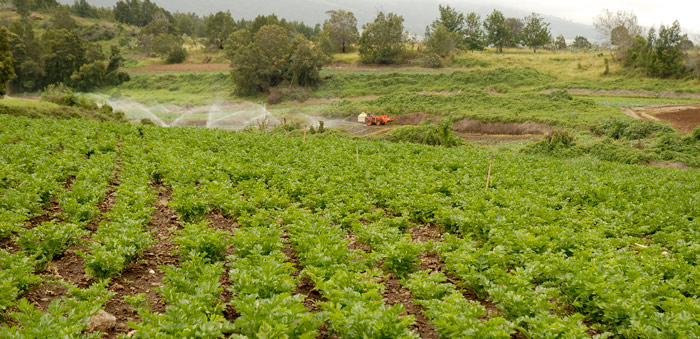
As we shared in the last issue, voters in Maui County will soon receive their ballots. Among their many choices on the ballot will be a Charter Amendment question:
“Shall the Charter be amended, effective July 1, 2022, to establish a Department of Agriculture to develop a sustainable regional agricultural system for Maui County?”
|
On the surface it may sound harmless, but there is a lot behind the simple question that should cause you to strongly consider voting NO. During the first week of September, you, our members, were polled to determine how you felt about the proposal to create a County Department of Agriculture. The results revealed a strong objection to the proposal with 84% of you – farmers & ranchers – responding, saying NO to the ballot question. |
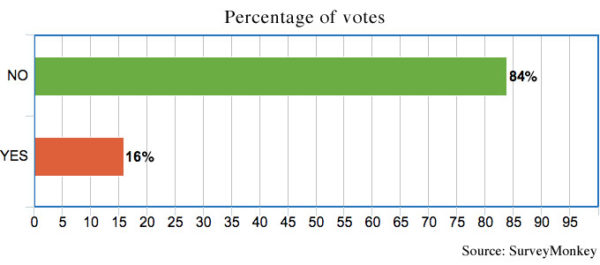
There are four major reasons members voiced such strong opposition:
1. This is not the right time to expand government. Revenues are plummeting and many of our residents are without jobs, some even losing their homes — in fact, the unemployment rate has hit 21% on Maui, and the future is uncertain. Setting up this department as described will cost taxpayers several million dollars and is projected by its proponents to cost at least another five to ten million dollars per year to fund it. At a time when government should be streamlining its operations, more financial burden on our residents is unwarranted.
2. The goals of the proposed new County department duplicate or conflict with many other federal and state organizations that regulate, advocate for, and oversee agriculture activity. Farmers must comply with laws, regulations, and policies under U.S. Department of Agriculture, the U.S. EPA, the Hawai‘i Department of Agriculture, the Hawai‘i Department of Health, and many others. Farmers and ranchers also work closely with the UH College of Tropical Agriculture and Human Resources, the Natural Resources Conservation Service, the Farm Service Agency, the Soil and Water Conservation Districts, and others who play a role in guiding agricultural producers. We should be enhancing and encouraging these existing partnerships instead of trying to duplicate them.
3. Farmers don’t need another bureaucracy to regulate their activities. Farmers testified at the Council hearings that this will be yet another regulatory bureaucracy, making farming more difficult rather than helping. Their fears are justified — the proposal included an entire division of Compliance and Enforcement within the new department. Although the details have since been removed, the Council added language to allow the new department to regulate and enforce against farmers. This places farmers in Maui County at an unfair disadvantage since every new rule and restriction will only apply to Maui farmers, not to farmers in any other county. This will make it more expensive and more difficult for Maui farmers to compete with other farms throughout the State, or from the mainland.
4. Creating an entirely new Department is no small undertaking. It requires a change in our County Constitution. Its goals and objectives, not to mention costs to taxpayers, should be well-reasoned. Maui has a Charter Commission whose purpose is to thoroughly vet proposed charter amendments and conduct a robust community outreach effort. They meet only once every ten years but they are scheduled to convene next year. Unfortunately, with no advance consultation with the State Department of Agriculture or Maui’s dedicated long-time farmers, the Council, in a 6-3 vote, chose to by-pass the Charter Commission in its rush to create this new Department.
The farm and ranch members of the Maui County Farm Bureau grow and raise nearly every agricultural product on Maui, including vegetables, flowers and nursery products, livestock, tree crops, fruits, eggs, poultry, seeds and more, as well as producing value-added agriculture products. Our farmers are as diverse as our crops, but our collective voice is strong on this issue, vote NO on this Charter Amendment.
More CARES ACT Funds on the Way
Executive director Warren Watanabe and President Teena Rasmussen served on the Mayor’s Task Force for Farm and Food. This task force was formed to propose and conduct a thorough vetting of programs that would be most beneficial to our farmers, ranchers and food distribution programs. We are happy to report that the Mayor has informed us we will be receiving funds to purchase produce and meat through at least the month of October, and possibly to the end of year to continue our Farm Product Purchase Program. We also submitted a proposal for the Kula Vacuum Cooling and Processing Plant to receive $95,000 for critical repairs to their refrigeration units. Bids are already coming in for that project. Lastly, there will be a $2.5 million grant program for farmers and ranchers that should be up and running within the next two weeks. These funds will be administered by the Maui Chamber of Commerce, with input by MCFB and Hawai‘i Farmers Union United (HFUU) on how to make sure the funds go to production farmers. We will send out more details as they unfold.

Maui County Farm Bureau Announces Member Awards
Maui County Farm Bureau is proud to celebrate those members who demonstrate tremendous support for Maui agriculture, especially during these tumultuous times. The 2020 member award winners are: “Friend of Agriculture,” Nelson Okumura; “Member of the Year,” Alex Franco; “Family of the Year,” Gobles Flower Farm; and “Mike Lyons Award,” David Chun.
“Our members believe in the essential and inherent value of farming, and they understand how agriculture enriches our community,” said MCFB’s executive director Warren K. Watanabe. “These awards are important because they recognize our farm families and their efforts to further and strengthen a healthy and viable agricultural industry in Maui County.”
MCFB 2020 “Friend of Agriculture” Award
Nelson Okumura, president, VIP Foodservice and Island Grocery
Maui is rooted in family-owned businesses, and a Maui favorite is the Okumura family’s VIP Foodservice and Island Grocery. President Nelson Okumura is a second-generation family owner.
Nelson’s support during Covid-19 reminded MCFB that the Okumura family have always been staunch supporters of Maui agriculture. The company was established in 1951 by Roy Okumura with the motto: “We are proud to be a local company, serving our island home of Maui.” From the beginning, they worked one-on-one with Maui farmers and ranchers to sell their products to business and consumers.
In 1963, the company expanded beyond produce and became a broadline foodservice distributor. Today, between the two businesses, 150 team members serve Maui businesses via its VIP Foodservice division and consumers via its Island Grocery Depot Stores in Kahului and Lahaina.
VIP Foodservice serves a diverse base of over 760 operators, including resorts, restaurants, grocery stores, healthcare and schools. The service helps businesses become more cost efficient, connecting them with the ingredients they need so they can focus fully on customer satisfaction. VIP works both with farmers and ranchers to offer local produce and proteins, and with other suppliers to provide trusted national brands.
From the opening of the first store in 1985 until 2014, everyone knew VIP’s grocery division as VIP Cash N’ Carry. In 2014, the store name was updated to Island Grocery Depot. Today, the two stores in Kahului and Lahaina provide hard-to-find local specialties and Maui’s favorite nationally branded products, in both individual and bulk sizes.
The Okumura family have always been unwavering supporters of MCFB. When the Covid-19 crisis hit in March, Nelson stepped up to orchestrate the huge task of moving perishable food from Maui’s farms to the general public pick-up points. Without hesitation, he provided chilled food storage and distributed Grown on Maui produce to the community.
“Without Nelson’s support, MCFB and the County of Maui would not have been able to service the needs of our community in an efficient and organized way,” Rasmussen says. “Over the years, Nelson has always been there ready to help, whether it’s donations for an ag program or a place to host a meeting. He doesn’t seek recognition or ask for anything in return. He merely steps forward and helps get the job done.”
Congratulations to Nelson Okumura and the Okumura family, Maui County Farm Bureau’s 2020 “Friend of Agriculture” Award recipients.
MCFB 2020 “Member of the Year” Award
Alex Franco, president/general manager, Maui Cattle Company
When Maui Cattle Company, LLC was founded 18 years ago, Alex Franco was named president and general manager, and he has held that position until his retirement on June 30, 2020
 Back in 2002, six independent family-owned ranches spanning over 60,000 acres of prime grazing land came together to found MCC. With Alex at the helm, their vision remains clear to this day: to reinvigorate an agricultural lifestyle through the establishment of a sustainable ranching industry. The group knew they could achieve this vision if they kept their livestock on island and if they delivered a premium product to local businesses and consumers.
Back in 2002, six independent family-owned ranches spanning over 60,000 acres of prime grazing land came together to found MCC. With Alex at the helm, their vision remains clear to this day: to reinvigorate an agricultural lifestyle through the establishment of a sustainable ranching industry. The group knew they could achieve this vision if they kept their livestock on island and if they delivered a premium product to local businesses and consumers.
Today, the owner-partners of MCC include Haleakala Ranch, Ulupalakua Ranch, Kaupo Ranch, Nobriga Ranch, Hana Ranch and Mahi Pono.
Known by everyone as a humble, smart, hardworking and honest person, Alex is the kind of guy you want on your side when the going gets tough. He doesn’t give up. In his decades working in the livestock industry, he’s proven his commitment to raising cattle in the islands, and he knows firsthand the work required to bring a quality product to market.
Alex was instrumental in realizing MCC’s vision to provide 100% grass-fed, all-natural beef raised on Maui to restaurants, hotels and consumers. He helped secure a contract in the food service industry to get local beef in the Federal School Lunch Program on Maui. Working closely with Elli Funakoshi, now MCC’s operations manager, he created a value-added beef jerky product and a new custom vacuum-sealed packaging. In 2019, he helped open a new USDA certified slaughterhouse, giving MCC more flexibility on the amount of cattle to slaughter.
Alex has always worked hard to represent Maui’s livestock industry on a statewide level and by serving on the Maui County Farm Bureau board of directors. Throughout multiple droughts and recessions, 9/11, hurricanes, and other natural disasters, Alex has been a steady hand for Maui’s livestock industry, supporting MCFB’s programs along the way and leaving an impressive legacy at Maui Cattle Company.
Congratulations to Alex Franco: Maui County Farm Bureau’s 2020 “Member of the Year”.
MCFB 2020 “Farm Family of the Year” Award
Goble’s Flower Farm
All it took was one field of carnations in Upcountry Maui, and Captain W.C. Goble USMC (retired) was hooked. That was more than 30 years ago, and Woody Goble has been cultivating, producing, arranging and shipping tropical flowers ever since.
Born and raised in New Jersey, Goble graduated from Citadel in South Carolina in 1966 and flew CH46 helicopters in the Vietnam War. In 1970, he met his wife Carmen, who was from Maui but was working as a bank teller at Kaneohe Marine Corps Bank. After visiting an acquaintance’s carnation flower farm on Maui with Carmen, Woody knew he wanted to move to Maui and start his own flower farm.
He and Carmen began by growing carnations, baby’s breath and mums on leased land in Upper Kula. In a second wave of flowers, they grew bird of paradise, eucalyptus and protea. Today, the Gobles own eight beautiful acres on Thompson Road. Woody creates his signature flower bouquets by adding flowers from Hawai‘i Island—like anthurium, heliconia and pink and red ginger to his magnificent Maui-grown flowers.
The Gobles have four grown children—Roberta, Gavin, Morgana and Chip—who live on the mainland and visit often; and eight grandchildren. Woody knows farming can be a tough business, but he still hopes one of his children will carry on the farm operation.
What does Woody love most about being in the flower-growing business? “Selling flowers to people and watching them smile,” he says.
Congratulations to Goble’s Flower Farm on being awarded Maui County Farm Bureau’s 2020 “Farm Family of the Year”.
MCFB 2020 “Farm Family of the Year” Award
David Chun, Legislative Director for Tulsi Gabbard
When David Chun examines ways to help food producers on Maui and statewide, his approach is primarily to view industry stakeholders as businesspeople who happen to be engaged in the livestock, fruit, vegetable, seafood, flower, value-added production, retail/wholesale, and/or supply chain industries.
“It is my belief that the food production system is a key third economic leg to tourism and military,” Dave says. “The system must be resilient enough to withstand global calamities, pandemics, economic recessions, and other storms yet to happen.”
As legislative director for Congresswoman Tulsi Gabbard, Dave advocates tirelessly to increase this resiliency for the islands’ agricultural industry. Key projects have included heading up a biocontrol project working group to address the coffee berry borer, as well as creating legislation to address damages in the islands caused by the two-lined spittlebug. In light of the Covid-19 economic disruption, Dave crafted a letter to House leadership and appropriators urging support for Hawai‘i food producers.
A graduate of Kamehameha Schools, Dave earned his B.A. in Political Sciences and Urban Studies from California State College in Sonoma. He went on to gain an appreciation of cultures and diversity through living and working in Europe, Nepal, India, Morocco, Greece, Israel, Palestine, Sinai Desert, the U.S. West/East Coasts, and Appalachian regions.
Dave was last year’s recipient of the Ka Lei Hano Heritage Award. This award is the highest tribute given by the University of Hawai‘i College of Tropical Agriculture and Human Resources (CTAHR) to those who have enhanced the College’s efforts to support a diverse economy, healthy environment, and strong communities.
On Maui, the MCFB Mike Lyons Award exemplifies the dedication to community for which the late Mike Lyons was known. A vice president for Bank of Hawai‘i, Mike helped many nonprofits on the Valley Isle during his 40-plus years of service. He was a founder of MEDB and served as a community leader and volunteer board member for numerous groups.
“We are pleased to recognize Dave Chun as the Mike Lyons awardee,” Rasmussen says. “Dave carries out his commitment to community in the work he does on behalf of farmers every day.”
Although Dave doesn’t have many spare moments in his busy schedule, his favorite pastimes include hanging out with the lambs and kids at his Maryland farm and watching YouTube clips on the history and cultivation of crops. Agriculture is never far from his mind.
Congratulations to David Chun on being named Maui County Farm Bureau’s 2020 “Mike Lyons Award” recipient.

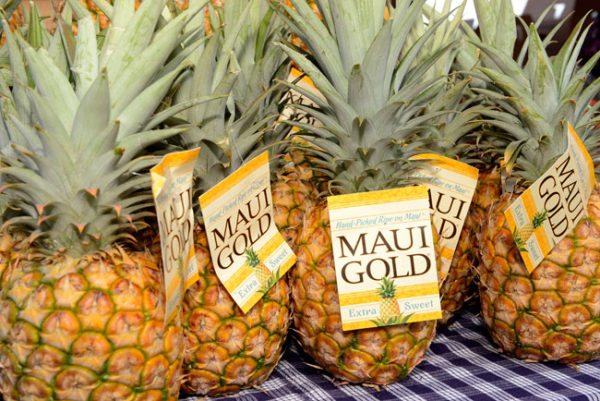
Pineapples on Maui are Sweeter than Ever
There aren’t too many crops on Maui with a prouder heritage than hala kahiki, or pineapple, and most especially: Maui Gold®. The large, extra sweet, low-acidity pineapple is grown on the sunny slopes of Haleakalā and symbolizes the aloha and hospitality of our islands.
Once the second-largest industry on Maui after sugarcane, pineapple almost disappeared from the island agricultural scene after Maui Pineapple Company shut down operations in 2009. But in 2010, a group of dedicated and knowledgeable agricultural folks launched Maui Gold Pineapple Company to save the tradition of pineapple production on Maui. That tradition goes back to the mid-1800s, when whalers paid 28 cents apiece to combat scurvy, and Lahaina began shipping wild-varietal fruits.
Today, Maui Gold Pineapple Company has 757 acres in Hali‘imaile and 50 employees. More than half the acreage is farmed (400 acres), while the rest of the land is left fallow to rest and recuperate for the next planting. MGPC built a highly efficient new packing facility in 2010, adjacent to its farming operation, that decreased fruit loss from more than 30 percent to less than 3 percent.
Over the years, taking visitors into the fields to learn the story of pineapple became a popular agritourism attraction. The Maui Pineapple Tour was the only remaining working pineapple plantation tour in the United States. Due to Covid-19, the program is on hold for now, but MGPC hopes to start it up again through operator Go Zip, LLC, when tourism returns.
Collaboration and innovative uses of the golden fruit have long been a part of pineapple’s success. MauiWine at ‘Ulupalakua Ranch produces popular pineapple wines made from the juice of fresh, hand-picked Maui Gold. Maui Brewing Company and Hali‘imaile Distilling Company also use the fresh pineapple juice. Students at Maui Culinary Academy in Kahului worked with local chefs and farmers to develop a rich, smoky-flavored roast-pineapple jam.
Maui Gold® can be found in most Maui hotels and resorts, as well as in Costco and distributed on Hawai‘i Island and O‘ahu. Both whole and cut fruit is distributed via main distributors/wholesalers, like VIP Foodservice, Cisco, Sunfresh, etc.
Pineapples have been integral to the culture, lifestyle and agriculture of Hawai‘i for well over 100 years. As the only remaining pineapple plantation nationwide with traces to hala kahiki’s island legacy, Maui Gold Pineapple Company is truly an invaluable member of our agricultural community.

Meet Rudy Balala, Director
“Pineapple and Maui belong together,” says MCFB Director Rodrigo “Rudy” Balala. “Wild varieties grew here before westerns came. Pineapple has shaped an integral part of the island’s identity.”
 You might say the same is true for Rudy himself. Pineapple has been a part of his life since 1979, when he got a summer job as a high schooler harvesting pine for Maui Pineapple Company. Instead of leaving at summer’s end, he stayed and started driving trucks. Little did he know, some 40 years later, he would be running the show as general manager for Hali‘imaile Pineapple Company.
You might say the same is true for Rudy himself. Pineapple has been a part of his life since 1979, when he got a summer job as a high schooler harvesting pine for Maui Pineapple Company. Instead of leaving at summer’s end, he stayed and started driving trucks. Little did he know, some 40 years later, he would be running the show as general manager for Hali‘imaile Pineapple Company.
At Maui Pine, Rudy worked his way up to director of harvesting and packing operations. Determined to grow with the company, Balala attended Maui Community College while working the fields. He learned what it takes to grow a premium quality pineapple from the inside out. He saw the transition from pineapple for the canning market, to pineapple as a fresh and perishable fruit for local stores. And, in 2010, he became instrumental in keeping pineapple’s heritage on Maui alive. Balala served as Executive Vice President for the new Maui Gold Pineapple Company, overseeing both production and sales.
Oftentimes, Rudy says people don’t realize that pineapple is still grown on Maui. “Pineapple ag on Maui may be on a smaller scale than in previous decades, but it’s more significant than ever,” he says. “We are a local company, and we do all we can to support other local businesses. We need the community’s support, and we ask everybody to ‘Buy Local.’”
Even after four decades working in pine, Rudy still loves it. He loves being outdoors; helping employees, customers and vendors; and working with other folks who have been in the pineapple industry as long as he has. On his days off, he enjoys fishing and spending time with family.
Does he still love the taste of pineapple? Of course—as long as it’s Maui Gold®.

Meet James Tavares, Owner of the Grassmaster
Coming from a Maui family that goes back several generations of extraordinary people, sod farmer James Tavares has always been focused on success.
Born and raised on the family property in Ku‘au, James graduated from St. Anthony School in 1974 and headed off to University of Hawai‘i. At the College of Tropical Agriculture and Human Resources, he earned his bachelor’s degree in general agriculture and then pursued his master’s degree in horticulture science. That’s when he became fascinated by sod cultivation.
Working as a graduate assistant for Dr. Charles Murdoch, James maintained the professor’s turf plots at the Waimanalo Research Station and learned all about the different varieties. “I might not have made it through grad school had it not been for Dr. Murdoch’s guidance, support and encouragement,” James recalls.
When James finished his degree in 1983 and came back to Maui, development was just beginning in Wailea—acres and acres of smooth green grass. It was a good time to start planting. James lived on A&B’s Diversified Agriculture Nursery in Kahului at the time and planted out the grasses there in trays. He later planted an area in Ku‘au where he lives now, easing into sod farming on a small scale. Before long, he was ready to make the move up to Kula Agricultural Park.
Today, James is the owner of The Grassmaster, a 20-acre sod farm at Kula Ag Park. He is celebrating 33 years in business, and 30 as a member of Maui County Farm Bureau. He was one of the founding fathers of the Maui Association of Landscape Professionals when he worked for 13 years as an extension agent at CTAHR – Kahului.
Sod farming is very different from other types of farming, James says. “Sod is just the form that the grass is harvested in. It’s really all about the grass.” Every type of grass has its pros and cons, but the goal for James is always to produce the highest quality product.
High standards definitely run in the family. James’s father, William Tavares, was the principal of Makawao Elementary School for 19 years, following a few years as principal at Keokea Elementary and Kealahou School (now Haleakala Waldorf School). His grandfather was Antone F. Tavares, a self-made businessman on Maui as well as a territorial senator. His uncles Freddie and Ernest were ground-breaking engineers, musicians and performers, who helped create the Fender Stratocaster and the Fender 1000 Pedal Guitar, among other inventions.
James and his wife Helen have three children: Melissa, who works for the USDA Farm Service Agency on Kaua‘i; Christopher, who works on the family sod farm along with James’s brother Paul Tavares; and Taylor, a 2nd Lieutenant and soon-to-be Intelligence Officer with the U.S. Air Force; along with one baby granddaughter, Kawailehua.
Even after 33 years in farming, James still loves “working outdoors, getting sweaty and dirty and being my own boss.” He’s hopeful that agriculture—and healthy sod—will continue to grow as an essential part of the islands’ economy.
MCFB Members Enjoy Cacao Farm Tour & Chocolate Tasting
Looking for a fun activity? Go to www.mauichocolate.com and click “learn” and read all about the chocolate tastings offered by the knowledgeable folks at Maui Kuʻia Estate Chocolate, one of MCFBʻs newest members. Hereʻs an opportunity to learn more about farming cacao and creating a value-added agricultural product.
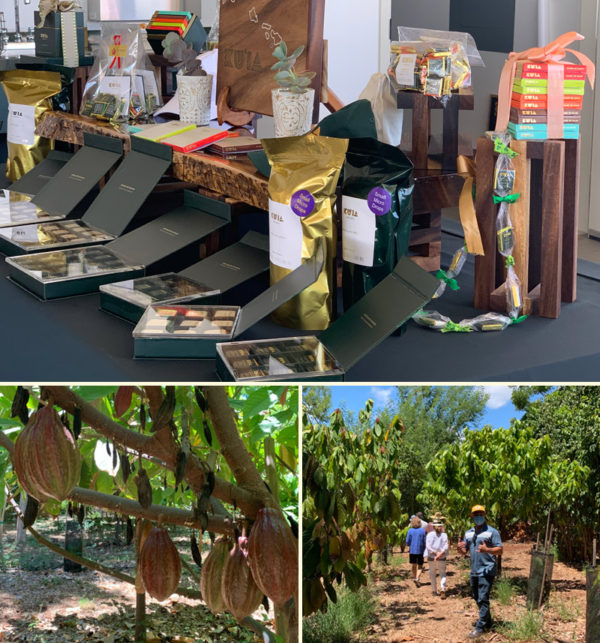
There are kamaʻaina rates with two tastings available on Saturdays and several tastings daily, Monday thru Friday. As soon as the travel quarantine is lifted, MKEC will offer cacao farm tours. The cacao farm is one mile from the chocolate factory. COVID-19 rules and regulations apply.Wear masks upon entry.
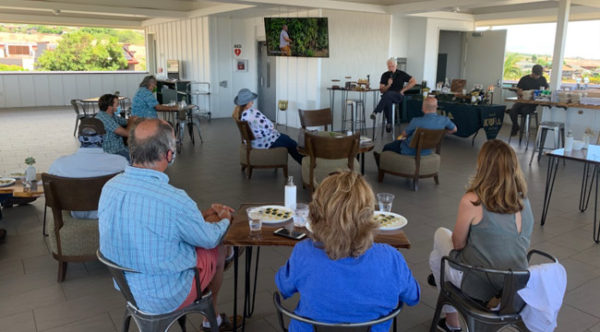

The Hawai‘i Farm Bureau annual meeting is coming up soon. The annual meeting is when the eleven county chapters get together to conduct the business of the federation. County delegates discuss items such as the budget, receive presentations of reports from our president, executive director, committees, counties, legislature, and agencies, and the election of our officers. It is also a time to recognize our members for their efforts on behalf of HFB and to have fun with our fellow members and supporters.
In consideration of the pandemic and the safety of everyone, this year’s annual meeting will be virtually convened on October 28th. Only critical business items that need to be addressed will be on the agenda. MCFB has five delegates this year which is determined by the number of paid regular member during the fiscal year.
An important part of the annual meeting is our legislative package. The House of Delegates will review the proposals and vote whether they are accepted into the package. With the current state financial situation and the needs of the community, it may be wise to focus on policies and not monetary bills. We should be positive and develop a State Agricultural Strategic Plan that is pragmatic and implementable to assure a strong and resilient industry for farmers and ranchers across the state. We cannot afford to continue applying piecemeal remedies that aren’t long term solutions. Farmers and ranchers thoroughly understand this concept as they operate their farms in a way that is sustainable for future generations. Our policymakers on all levels need to listen to our producers if agriculture is to become a gorilla in the economy.
Warren K. Watanabe
Executive Director

I have been reflecting on where we would be today if we had not had a strong Farm Bureau in place when COVID hit. Thankfully due to the strength of the Maui County Farm Bureau, our paid staff, excellent accounting, strong relationships with government, a solid board who stepped up to handle everything that came at us, we have been able to be that conduit between government and our industry. As we have witnessed statewide, every division of government has been stretched to capacity.
Without the strong non-profits in our community, CARES ACT funds would never have reached the people it needed to. We didn’t see this coming, but when it did—your Farm Bureau was ready and we took a leadership role in designing programs to help our agriculture community. Your membership in Farm Bureau enables us to do this critical work and advocacy for our members. These are extraordinary times, but together we will make it through.

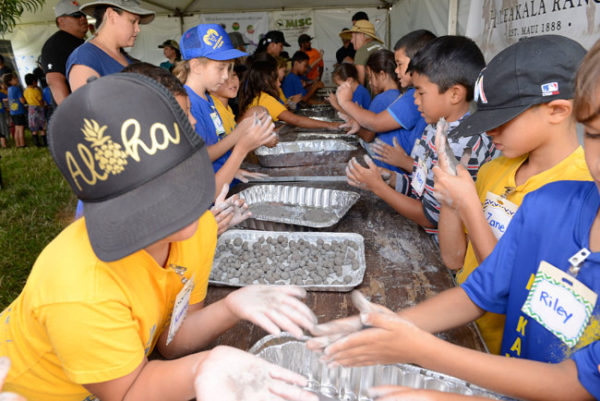
Agriculture in the Classroom Now in its 13th year, MCFB will create its in-classroom curriculum titled – “Where would we be without seeds” – into a lesson plan with video to distribute to second graders and teachers island wide. MCFBʻs AIC program reaches more than 1,200 students each year.
Maui AgFest & 4-H Livestock Fair MCFB is working with Maui County Council and Maui County Parks Department to obtain a five year license agreement to host AgFest at War Memorial Complex the first Saturday following Memorial Day for the next five years 2021 – 2025.


MCFB is happy to share recipes from Maui Gold Pineapple Co., and Maui Ku’ia Estate Chocolate, two members who grow a specialty crops. Here are two easy recipes we encourage you to try. Order chocolate chips and pineapple online.
Maui Gold® Pineapple Salsa
Ingredients:
– 1 Maui Gold® Pineapple, skinned, cored, diced to ¼ inch
– 1 red pepper, diced
– 1-2 jalapenos, chopped and seeded
– ½ small bunch cilantro, chopped
– ½ media red onion, diced small
– 1/8 cup lemon juice
– Salt and pepper to Taste
Directions:
Mix all salsa ingredients together. Enjoy.
Maui Ku‘ia Estate Chocolate Semi Sweet Muffins – (Dairy Free)
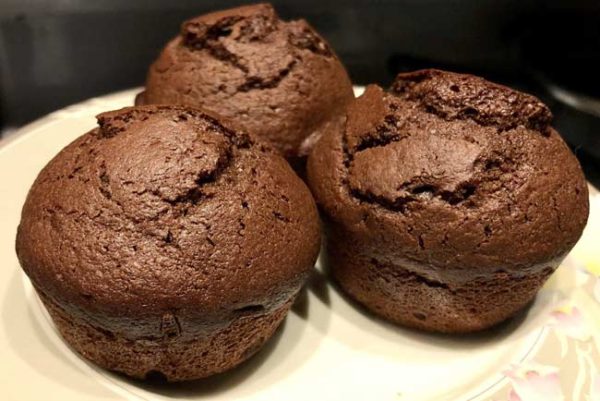
Ingredients:
– 2 cups of flour
– 3/4 cup sugar
– 1 tablespoon baking powder
– 1/2 teaspoon salt
– 2 eggs
– 1 1/4 cups coconut milk (full fat)
– 1/3 cup coconut oil
– roughly 1 cup Ku’ia Dark Chocolate (flavor of choice)
Directions:
1. Preheat oven to 400 degrees and oil muffin pan
2. In a medium bowl, mix four, sugar, baking powder, and salt. Set aside.
3. In a larger bowl, whisk eggs and coconut milk. Set aside.
4. Slowly mix wet ingredients into dry ingredients. Stir thoroughly.
5. In a double boiler (or microwave), melt coconut oil and dark chocolate and mix together.
6. Add chocolate and oil mixture to the other ingredients and mix well.
7. Scoop batter into a greased muffin pan, filling each cup about 3/4 full.
8. Bake for approximately 20 min.

Drought conditions hurting farmers and increasing chance of wildfires.
www.khon2.com/local-news/drought-conditions-hurting-farmers-and-increasing-chance-of-wildfires/
The Maui County Farm Bureau received $15,000 from First Hawaiian Bank’s Aloha for Hawaii campaign and is using the funds for a produce purchase-distribution program. www.mauinews.com/news/community-news/2020/09/farm-bureau-nets-15000/
